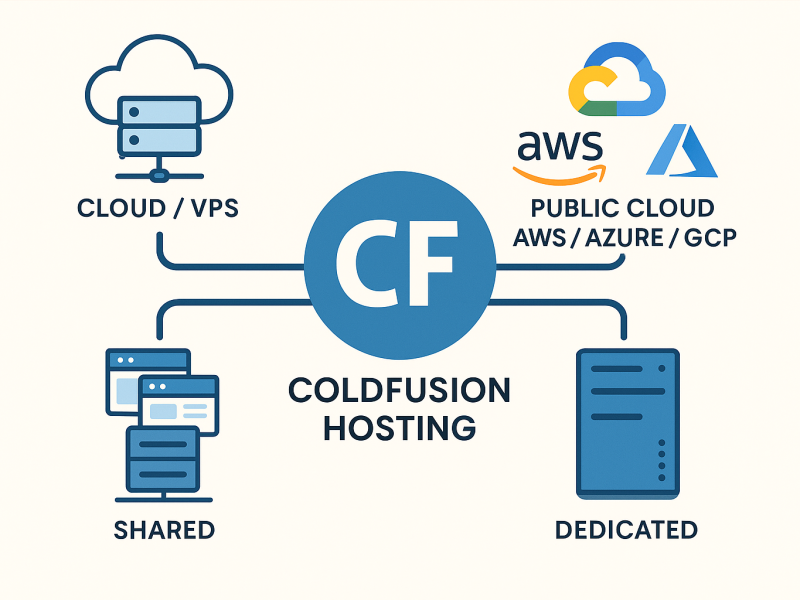When selecting a hosting solution, businesses often consider both Kubernetes and VPS (Virtual Private Server) hosting, each of which offers distinct advantages depending on the specific requirements. This comparison will explore areas like auto-scaling, update deployment, security, and resource management, along with considerations for Adobe ColdFusion applications. Understanding these differences will help you determine the best fit for your application’s needs. Whether Kubernetes or a VPS Server is best for you, the team at xByte Cloud has the experts to help you manage your infrastructure.
Key Areas of Comparison
- Auto-Scaling
- Kubernetes: Kubernetes is built for auto-scaling, allowing applications to adapt automatically to changing demand. The Horizontal Pod Autoscaler (HPA) adjusts the number of pod replicas based on real-time metrics. This capability is beneficial for applications with varying traffic, as it helps manage resources efficiently by scaling up during high demand and down during low-demand periods. Automated tools from AWS and Azure can also be used to enhance or replace the autoscaling from Kubernetes.
- VPS Hosting: VPS hosting can support horizontal scaling through server clustering, where multiple VPS instances work together to handle higher loads. However, unlike Kubernetes, VPS clustering typically involves manual setup and configuration. Scaling is also less immediate and requires more oversight, making it a better fit for applications with steady, predictable growth rather than sudden traffic surges.
- Deploying Updates
- Kubernetes: Known for its seamless support of CI/CD pipelines, Kubernetes enables low-downtime updates with deployment methods like rolling updates and blue-green deployments. This allows applications to stay online during updates, making Kubernetes ideal for teams prioritizing frequent deployments. Testing applications can also be easier within a Kubernetes environment because of the ability to easily spin up testing environments on demand, run through your progression of automated test scripts, and then take down anything not needed for other testing.
- VPS Hosting: For traditional hosting environments using Virtual Machines, continuous deployment can be leveraged through third-party tools or custom scripting. Options such as Capistrano or SSH-based scripts are frequently used to streamline CI/CD pipelines, as highlighted in A Reddit discussion on DevOps. While VPS hosting may lack built-in deployment automation, modern CI/CD tools can still be leveraged in these environments to streamline your deployments. Traditional tools like FTP and SFTP can also be leveraged in these scenarios.
- Security
- Kubernetes: Kubernetes offers advanced security controls, such as role-based access control (RBAC), network policies, and pod security policies, though they require active configuration and regular maintenance. Kubernetes security is a shared responsibility, meaning users must keep up with best practices and updates to avoid vulnerabilities.
- VPS Hosting: VPS hosting offers an isolated environment, where security often involves setting up firewalls, managing user permissions, and keeping the server updated. Some hosting providers, like xByte Cloud, offer managed VPS services that handle these security aspects, ensuring that patches, configurations, and security settings are maintained by experts. This option is valuable for organizations that want the benefits of VPS hosting without dedicating in-house resources to security management.
- Resource Management
- Kubernetes: Kubernetes is designed to orchestrate resources across clusters, providing efficient management for applications requiring dynamic scaling and distributed architecture. This setup is well-suited for complex, containerized applications that benefit from cross-node resource allocation.
- VPS Hosting: With a VPS, resources (CPU, RAM, storage) are dedicated within a virtualized server, which is ideal for applications needing consistent, predictable performance. However, unlike Kubernetes, which manages resources dynamically, a VPS typically has fixed resources unless you manually resize or cluster it. This makes VPS hosting a better fit for applications with steady demands rather than those requiring high elasticity.
- Cost Efficiency
- Kubernetes: Managed Kubernetes services often follow a pay-as-you-go model, which can be cost-efficient for applications with variable workloads. However, costs can increase as resource demands grow, and careful monitoring is required to optimize costs effectively. While you may gain efficiencies in resource utilization, the management of the application may increase your costs. To deploy and maintain an environment requires a team that understands the hurdles and challenges, which results in additional expenses with staffing. So, the low downtime and auto scaling could cost you not only more in resources but expertise management.
- VPS Hosting: VPS hosting generally has a fixed monthly cost, which is beneficial for budgeting and predictable expenses. However, organizations should be cautious about potential variable charges, such as bandwidth fees, which can add unexpected costs. For businesses with stable workloads, VPS hosting provides a straightforward pricing model that helps avoid the complexities of pay-per-use billing.
Adobe ColdFusion and Environment Variables
For Adobe ColdFusion applications, managing environment variables effectively is crucial for configuration and security. Here’s how Kubernetes and VPS compare in handling these variables:
- Kubernetes: Kubernetes uses ConfigMaps and Secrets to manage environment variables across containers, offering centralized, secure management of configuration data and sensitive information like API keys. This approach is advantageous for ColdFusion applications requiring consistent variable management across distributed services.
- VPS Hosting: On a VPS, environment variables are typically configured at the server level. While this approach can be straightforward, it may lack some of the centralized management features of Kubernetes. However, for ColdFusion applications that do not require distributed configuration, a VPS can handle environment variables securely within the server’s isolated environment.
Conclusion: Kubernetes or VPS?
Choosing between Kubernetes and VPS hosting ultimately depends on the unique requirements of your application. Kubernetes is an excellent option for distributed applications that benefit from automation, seamless scaling, and low-downtime updates. It also shines in environments where CI/CD integration is a priority and resources must scale dynamically.
VPS hosting, in contrast, is ideal for applications with steady resource needs that prioritize simplicity and cost predictability. With the potential to cluster for horizontal scaling and options to be fully managed from providers like xByte Cloud, VPS hosting provides a reliable choice for businesses wanting a straightforward, secure environment. When managed carefully, a VPS setup can be both budget-friendly and performance-efficient, provided you monitor potential variable costs such as bandwidth usage.
Ultimately, the choice between Kubernetes and VPS hosting will depend on factors like workload variability, resource needs, and your team’s level of hands-on management expertise. Each solution brings unique strengths, enabling businesses to select the hosting environment that aligns best with their infrastructure goals.


